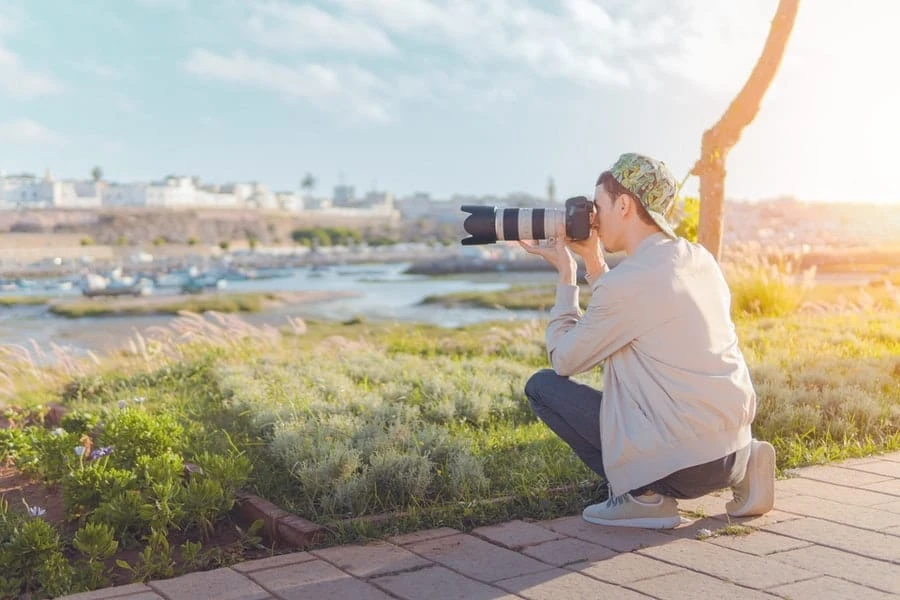
Thanks to essentially having a camera in our pocket everywhere we go, we’ve all become some level of amateur photographers. We know our rules of threes, we know how to pose, but is there more to it than that? Maybe we should be taking a large camera abroad, to really capture the beauty we’re seeing. Read on for more detail on why there is merit in taking a DSLR on holiday.
Although it is really easy to take photos on your phone, this can mean that by the end of a busy day your phone is full of hundreds of photos that are all similar and all hold little meaning. Using a camera will force you to think a little more carefully about what you are taking photos of, and spend even just a few more seconds getting the right angle and composure. Taking this care results in much more meaningful photographs, making you want to actually go back and look through all those holiday snaps.
Better The Camera, Better The Photos
As well as more carefully thought out photographs, taking a proper camera on holiday lets you take better quality pictures. Compared to a smartphone, a camera is much better optimized for taking high-quality photos even in low light, and faster focusing than a smart phone allows you to take photos of the kids enjoying that beach vacation without a bunch of blurry outtakes.
Taking a camera on holiday with you means you’ll be pulling out your phone much less often, and as a result you’ll be able to take a break from those constant text messages and email notifications you’re on holiday to disengage from. A camera gives you a chance to unwind and disconnect from the rest of the world for a little while.
On the flip side, if you are having to use your phone for other things while on holiday, there’s a good chance that your battery will drain quickly. A camera tends to have a better battery life than smartphones these days, and if it does run out it is super easy to switch it out for a spare, fully charged battery.
Smartphones are also very prone to running out of storage space. Nothing is worse than taking your phone out to capture the perfect holiday snap only to be met with a “storage full” message. A camera is designed to hold all of your photos and unlike a smartphone, it is easy to swap out SD cards for extra memory whenever you need to.
If you are going to take your camera on holiday with you, it is a good idea to insure it first, to make sure you’re protected against anything that could happen.
Insurance Should Be A Priority
Finding the right insurance plan for your camera can seem like a daunting task, but with Lemonade your camera is already insured as a part of your basic renters insurance or homeowner insurance plan. Along with your other valuables such as your phone or laptop, personal-use cameras are covered for all of the basic insurance ‘perils’.
If you’re looking to insure your camera for a wide range of scenarios, consider investing in extra coverage. In a basic plan, there is a sublimit (or payment cap) of $1500. This means that you can receive a maximum of $1500 on a successful claim. Lemonade also offers a customizable deductible, depending on your payment plans and budget.
For valuable items, such as cameras worth more than $350, upgrading to an extra coverage plan is well worth it. Extra coverage insures your camera for a few extra scenarios, including coverage against accidental loss (mysterious disappearance) and coverage against accidental damage. So, say you dropped your camera and broke a lens, you would be able to claim back the full amount to get your camera repaired or replaced. With extra coverage, there is also zero deductible, which means more money going back into your pocket!
Of course, this type of insurance will cost a little more than the standard policy but adding a camera to your plan will cost you anywhere between an extra $2-10 per month, for a whole host of extra perks.
Covering your gear such as extra lenses, tripods, or external flash is also available through extra coverage, but please note that each item will have to be scheduled separately and can only be added if a camera body is already scheduled too.
It is also worthwhile noting that if you use your camera professionally, even every now and again, it is no longer eligible for extra coverage. For insurance like this, a business owner’s policy would be a better option.








